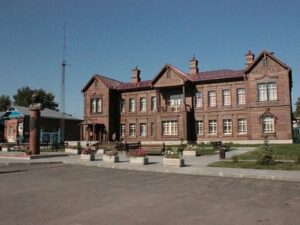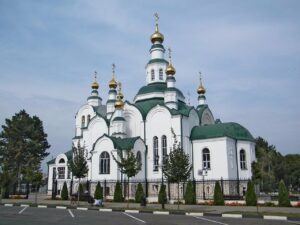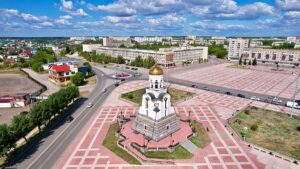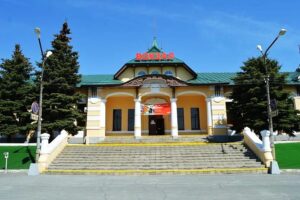Hanover (Hannover), Germany: A Comprehensive Exploration

New City Hall of Hannover reflecting in water in the evening, Lower Saxony, Germany
Introduction
Hanover, known as Hannover in German, is a city of remarkable historical significance, cultural vibrancy, and modern dynamism. Situated in the Lower Saxony state, Hanover serves as its capital and is renowned for its diverse attractions, including grand parks, innovative trade fairs, and a rich historical tapestry. This article delves deep into Hanover, exploring its historical evolution, architectural landmarks, cultural scene, natural attractions, economic landscape, and community life.
Historical Background
Early History: Hanover’s origins date back to the medieval period, with the earliest known record of the city appearing in the 11th century. Its strategic position along the Leine River made it an important trade and transport hub. Initially a small settlement, Hanover began to grow in prominence due to its advantageous location.
Hanoverian Electorate and Kingdom: In the late 17th century, Hanover became the capital of the Duchy of Brunswick-Lüneburg, which later evolved into the Electorate of Hanover. This period marked a significant phase in the city’s history, with the rulers of Hanover also becoming kings of Great Britain following the ascension of George I in 1714. This dual role enhanced Hanover’s political and cultural stature, leading to increased prosperity and development.
19th Century Industrialization: The 19th century was a transformative period for Hanover, driven by industrialization. The city saw the establishment of numerous factories, railways, and urban infrastructure. Hanover’s growth as an industrial center attracted a diverse population, contributing to its cultural and economic dynamism.
World War II and Reconstruction: During World War II, Hanover experienced extensive damage from Allied bombings, which devastated much of its historic architecture and infrastructure. The post-war period required significant reconstruction efforts, during which the city modernized while preserving its historical essence. This era also marked Hanover’s emergence as a major center for trade fairs and exhibitions.
Modern Era: Today, Hanover is a thriving metropolis known for its blend of historical charm and modern amenities. It continues to be a key player in Germany’s economy, culture, and education. The city’s ability to adapt and innovate has cemented its status as a vibrant urban center.
Architectural Highlights
Hanover Opera House (Opernhaus Hannover): The Hanover Opera House, built in the mid-19th century, is a prime example of classical architecture and a cultural landmark in the city. This grand building hosts opera, ballet, and musical performances, attracting audiences from near and far. The opera house’s stunning façade and opulent interior reflect the city’s rich artistic heritage.
New Town Hall (Neues Rathaus): The New Town Hall is one of Hanover’s most iconic structures, completed in 1913. This impressive building, with its distinctive dome and ornate design, serves as the seat of the city’s administration. Visitors can take an elevator to the top of the dome for panoramic views of the city. The New Town Hall symbolizes Hanover’s blend of historical and contemporary elements.
Hanover Herrenhausen Gardens (Herrenhäuser Gärten): The Herrenhausen Gardens are a testament to Hanover’s baroque heritage and horticultural excellence. These extensive gardens, established in the 17th century, include the Great Garden (Großer Garten), the Berggarten, and the Georgengarten. The Great Garden is renowned for its baroque design, intricate fountains, and classical sculptures. The Berggarten features exotic plants and a renowned orchid collection, while the Georgengarten offers a picturesque landscape ideal for leisurely walks.
Leineschloss: The Leineschloss, originally a medieval castle, has undergone several transformations over the centuries. Today, it houses the Lower Saxony State Parliament. The building’s classical architecture and historical significance make it an important landmark in Hanover. The Leineschloss stands as a reminder of the city’s political and architectural evolution.
Market Church (Marktkirche): The Market Church, officially known as the Church of Saints George and James, is Hanover’s main Lutheran church and an outstanding example of North German brick Gothic architecture. Built in the 14th century, the church features a towering spire, intricate brickwork, and beautiful stained glass windows. The Market Church is not only a place of worship but also a symbol of Hanover’s medieval history and architectural heritage.
Aegidienkirche: The Aegidienkirche is a poignant historical site in Hanover. Originally built in the 14th century, the church was destroyed during World War II and was left in ruins as a war memorial. The open-air church remains a somber reminder of the devastation of war and a symbol of peace and reconciliation. The Aegidienkirche’s ruins, with their ivy-covered walls and quiet atmosphere, provide a space for reflection and remembrance.
Cultural and Artistic Scene
Hanover State Opera (Niedersächsisches Staatstheater Hannover): The Hanover State Opera is a leading cultural institution, offering a diverse program of opera, ballet, and theater performances. The opera company is renowned for its high artistic standards and innovative productions. The State Opera’s repertoire ranges from classical masterpieces to contemporary works, attracting a broad audience and contributing to Hanover’s vibrant cultural life.
Sprengel Museum: The Sprengel Museum is one of Germany’s premier art museums, specializing in modern and contemporary art. The museum’s extensive collection includes works by notable artists such as Pablo Picasso, Max Ernst, and Paul Klee. The Sprengel Museum also hosts temporary exhibitions, educational programs, and cultural events, making it a dynamic center for artistic exploration and engagement.
Hanover International Fireworks Competition: The Hanover International Fireworks Competition is an annual event held in the Herrenhausen Gardens, attracting participants and spectators from around the world. This competition showcases spectacular pyrotechnic displays set to music, with each participating team presenting a unique and creative performance. The event highlights Hanover’s commitment to cultural excellence and innovation.
Hanover Jazz Club (Jazz Club Hannover): The Hanover Jazz Club is a renowned venue for live jazz music, hosting performances by local and international artists. The club’s intimate setting and vibrant atmosphere make it a favorite spot for jazz enthusiasts. The Jazz Club’s diverse program includes traditional jazz, modern jazz, and experimental music, reflecting Hanover’s rich musical heritage and contemporary creativity.
Hanover KunstFestSpiele: The Hanover KunstFestSpiele is an annual festival of contemporary arts, featuring performances, installations, and exhibitions across various disciplines. The festival brings together artists, performers, and audiences to explore innovative and thought-provoking works. The KunstFestSpiele’s interdisciplinary approach and commitment to artistic experimentation make it a highlight of Hanover’s cultural calendar.
Lower Saxony State Museum (Niedersächsisches Landesmuseum Hannover): The Lower Saxony State Museum is a comprehensive museum that covers natural history, ethnology, archaeology, and art. The museum’s diverse collections include fossils, artifacts from ancient civilizations, and works of art from different periods. The State Museum also offers interactive exhibits, educational programs, and special events, providing a rich and engaging experience for visitors of all ages.
Natural Beauty and Outdoor Activities
Eilenriede Forest: The Eilenriede Forest is one of the largest urban forests in Europe, offering a green oasis in the heart of Hanover. This expansive forest covers over 640 hectares and features a network of walking, jogging, and cycling paths. The Eilenriede Forest’s lush greenery, tranquil ponds, and diverse wildlife make it a popular destination for outdoor enthusiasts and nature lovers.
Maschsee Lake: Maschsee Lake is a man-made lake located near the city center, providing a scenic setting for a variety of recreational activities. The lake’s walking and cycling paths, boating facilities, and picnic areas attract residents and visitors alike. The annual Maschseefest, a summer festival featuring live music, food stalls, and entertainment, is a highlight of the city’s social calendar.
Tiergarten Hannover: Tiergarten Hannover is a historic park and wildlife reserve located in the Kirchrode district. The park covers 112 hectares and is home to a variety of animals, including deer, wild boar, and birds. Tiergarten’s natural beauty and serene environment make it an ideal spot for leisurely walks, wildlife observation, and family outings.
Georgengarten: The Georgengarten is part of the Herrenhausen Gardens and offers a picturesque landscape for relaxation and recreation. The garden’s expansive lawns, tree-lined avenues, and ornamental features create a serene and inviting atmosphere. The Georgengarten is a popular destination for picnics, leisurely strolls, and cultural events.
Hanover Adventure Zoo (Erlebnis-Zoo Hannover): The Hanover Adventure Zoo is a top attraction for families and animal lovers. The zoo features themed areas, such as the African savannah, the Canadian Yukon Bay, and the Indian Jungle Palace, providing immersive experiences and close encounters with animals. The zoo’s interactive exhibits, educational programs, and entertaining shows make it a fun and educational destination.
Wisentgehege Springe: Wisentgehege Springe is a wildlife park located near Hanover, dedicated to the conservation and breeding of European bison (wisents) and other native species. The park covers over 90 hectares and offers visitors the opportunity to observe bison, wolves, lynxes, and other wildlife in naturalistic habitats. Wisentgehege’s commitment to conservation and education makes it a valuable resource for wildlife enthusiasts.
Economic and Industrial Landscape
Economic Overview: Hanover is a major economic center in Lower Saxony and Germany, with a diverse and robust economy. Key sectors include automotive manufacturing, technology, logistics, finance, and services. The city’s strategic location, excellent transportation infrastructure, and skilled workforce contribute to its economic success.
Automotive Industry: Hanover is home to several major automotive companies, including Volkswagen Commercial Vehicles. The city’s strong automotive sector includes manufacturing, research and development, and supply chain operations. Hanover’s expertise in automotive engineering and innovation has positioned it as a key player in the global automotive industry.
Technology and Innovation: Hanover is a hub for technology and innovation, with a thriving ecosystem of startups, research institutions, and tech companies. The city’s focus on digitalization, automation, and smart solutions has attracted investments and talent in fields such as IT, software development, and telecommunications. The Hanover Fair (Hannover Messe), one of the world’s largest trade fairs for industrial technology, showcases the city’s leadership in technological advancements.
Logistics and Trade: Hanover’s strategic location at the crossroads of major European trade routes makes it a key center for logistics and commerce. The city is well-connected by rail, road, and air, facilitating efficient movement of goods and services. Hanover’s trade fairs and exhibitions, such as the CeBIT technology fair and the Agritechnica agricultural machinery fair, attract businesses and visitors from around the world, boosting the local economy.
Finance and Services: Hanover’s financial sector includes banks, insurance companies, and financial services firms. The city is home to major insurance companies such as Talanx and Hannover Re, which have a significant presence in the global insurance market. The services sector, including healthcare, education, and retail, also plays a vital role in Hanover’s economy.
Higher Education and Research: Hanover is home to several prestigious universities and research institutions, including the University of Hanover (Leibniz University Hannover), the Hanover Medical School (Medizinische Hochschule Hannover), and the Hanover University of Music, Drama, and Media. These institutions are renowned for their academic excellence and research contributions in fields such as engineering, medicine, and the arts. Hanover’s higher education and research landscape attracts students and scholars from around the world.
Startups and Entrepreneurship: Hanover has a growing startup scene, supported by incubators, accelerators, and innovation hubs. The city’s supportive ecosystem, access to funding, and collaborative networks provide fertile ground for entrepreneurs and new ventures. Startups in fields such as fintech, healthtech, and cleantech are finding success in Hanover, contributing to its reputation as a dynamic and entrepreneurial city.
Tourism and Hospitality: Tourism is an important sector for Hanover’s economy, attracting millions of visitors each year. The city’s rich history, cultural attractions, and trade fairs make it a popular destination for domestic and international travelers. The hospitality industry, including hotels, restaurants, and entertainment venues, plays a vital role in providing services and experiences for tourists. Major events, such as the Hanover Fair and the Oktoberfest Hannover, draw large crowds and boost the local economy.
Community and Quality of Life
Education and Schools: Hanover offers a high standard of education, with a range of schools and educational institutions to choose from. The city’s schools provide quality education from primary to secondary levels, with both public and private options available. Hanover’s universities and vocational training centers further enhance the educational landscape, providing opportunities for higher education and professional development.
Healthcare: Hanover has a comprehensive healthcare system, with modern hospitals, clinics, and medical practices providing excellent care to residents. The Hanover Medical School is one of Germany’s leading medical institutions, offering specialized care and cutting-edge research. The city’s healthcare facilities are complemented by a network of general practitioners, specialists, and wellness centers, ensuring the well-being of the community.
Public Transportation: Hanover’s public transportation network is efficient and well-developed, making it easy to navigate the city and surrounding areas. The Hanover U-Bahn (metro), tram, and bus systems provide convenient and reliable transit options, connecting key neighborhoods and attractions. The central train station offers connections to other major cities in Germany and beyond. The city’s bike-sharing program and pedestrian-friendly infrastructure further enhance mobility and sustainability.
Safety and Community: Hanover is known for its safe and welcoming atmosphere. The city’s low crime rate and strong sense of community make it an attractive place to live and visit. Various community organizations and initiatives promote social cohesion and support residents in need. Hanover’s diverse and inclusive population contributes to its vibrant and multicultural character.
Housing and Living Costs: Housing in Hanover is relatively affordable compared to larger German cities. The city offers a range of housing options, from modern apartments to historic homes. The cost of living is reasonable, with expenses such as groceries, transportation, and entertainment being more affordable than in major metropolitan areas. Hanover’s high quality of life, combined with its cultural and economic opportunities, makes it a desirable place to reside.
Notable Personalities
Gottfried Wilhelm Leibniz: Gottfried Wilhelm Leibniz, born in 1646, was a renowned mathematician, philosopher, and polymath. He is considered one of the greatest intellectuals of the 17th century. Leibniz made significant contributions to calculus, logic, metaphysics, and other fields. His connection to Hanover includes his role as a librarian and historian for the House of Hanover. Leibniz’s legacy continues to influence modern science and philosophy.
Hannah Arendt: Hannah Arendt, born in 1906, was a prominent political theorist and philosopher. Her works on totalitarianism, authority, and the nature of power are highly regarded in political science and philosophy. Arendt’s early life and education in Germany, including her studies in Marburg and Heidelberg, were pivotal in shaping her intellectual development. Although she spent much of her later life in the United States, her German heritage and experiences influenced her scholarly work.
Konrad Adenauer: Konrad Adenauer, born in 1876, was the first Chancellor of the Federal Republic of Germany (West Germany) and a significant figure in post-war German politics. Although not directly connected to Hanover, Adenauer’s policies and leadership played a crucial role in the reconstruction and modernization of Germany, which had a profound impact on cities like Hanover. Adenauer’s legacy as a statesman and advocate for European integration remains influential.
Max Born: Max Born, born in 1882, was a distinguished physicist and mathematician who made foundational contributions to quantum mechanics and solid-state physics. Born in Breslau (now Wrocław, Poland), Born’s academic career included positions in Göttingen and Frankfurt. He was awarded the Nobel Prize in Physics in 1954 for his work on the statistical interpretation of quantum mechanics. Born’s scientific achievements and his advocacy for peace and ethical responsibility continue to be celebrated.
Sports and Recreation
Hannover 96: Hannover 96 is the city’s premier football club, with a rich history dating back to its founding in 1896. The team competes in the Bundesliga, Germany’s top football league, and enjoys a passionate fan base. Home matches are played at the HDI-Arena, a modern stadium that hosts both domestic and international games. The club’s success and community engagement make it a beloved institution in Hanover.
Recreational Facilities: Hanover offers a wide range of recreational facilities, including sports centers, gyms, swimming pools, and parks. The city’s sports clubs and organizations provide opportunities for residents to engage in activities such as tennis, golf, cycling, and martial arts. Hanover’s commitment to promoting a healthy and active lifestyle is reflected in its well-maintained facilities and community programs.
Volkspark Stadium: The Volkspark Stadium is a multifunctional sports venue that hosts a variety of events, including athletics, football, and concerts. The stadium’s versatile design and modern amenities make it a popular location for sports and entertainment. The Volkspark Stadium’s role in hosting major events highlights Hanover’s status as a center for sports and recreation.
Water Sports: Hanover’s proximity to rivers and lakes provides ample opportunities for water sports enthusiasts. Activities such as sailing, rowing, and kayaking are popular on Maschsee Lake and other nearby bodies of water. The city’s water sports clubs and facilities offer training, equipment rentals, and organized events, catering to both beginners and experienced athletes.
Conclusion
Hanover (Hannover), Germany, is a city that seamlessly blends its rich historical heritage with modern innovation and cultural vibrancy. From its iconic landmarks and architectural treasures to its thriving arts scene and dynamic economy, Hanover offers a wealth of experiences and opportunities for residents and visitors alike. The city’s commitment to education, community, and sustainability ensures a high quality of life, making Hanover a truly remarkable and inspiring place to explore.




